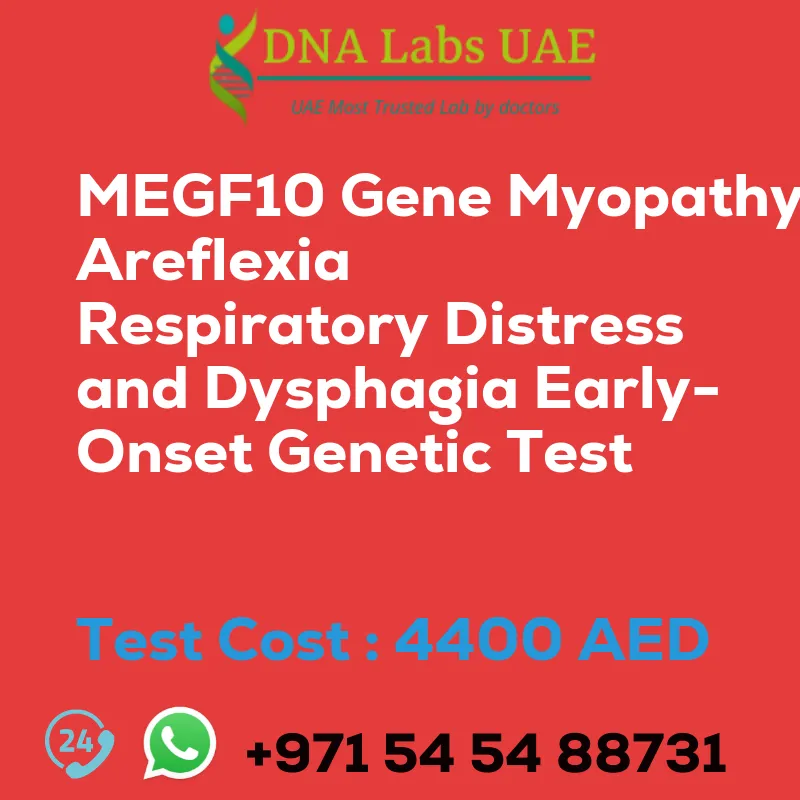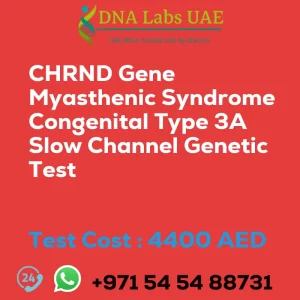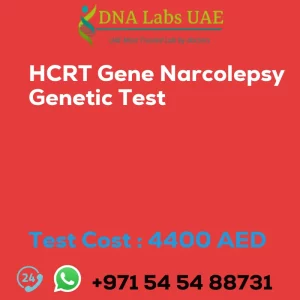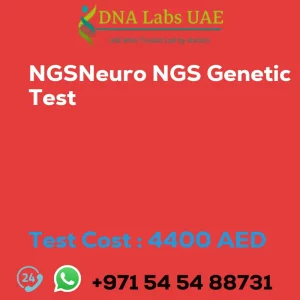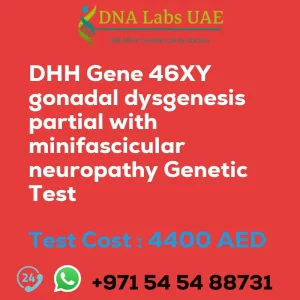MEGF10 Gene Myopathy Areflexia Respiratory Distress and Dysphagia Early-Onset Genetic Test
Are you concerned about muscle weakness, respiratory distress, and difficulty swallowing in your child? It could be a result of MEGF10 gene myopathy, a rare genetic disorder that affects muscle function. At DNA Labs UAE, we offer a comprehensive genetic test to diagnose MEGF10 gene myopathy and provide valuable insights for treatment and genetic counseling.
Test Details
MEGF10 gene myopathy is a rare genetic disorder characterized by muscle weakness and wasting, areflexia (absence of reflexes), respiratory distress, and dysphagia (difficulty swallowing). It is an early-onset disorder, meaning symptoms typically appear in infancy or early childhood. Our Next-Generation Sequencing (NGS) genetic testing method allows us to analyze the MEGF10 gene and identify any mutations or variations that may be contributing to the development of the disorder.
Components
- Test Name: MEGF10 Gene Myopathy Areflexia Respiratory Distress and Dysphagia Early-Onset Genetic Test
- Price: 4400.0 AED
- Sample Condition: Blood or Extracted DNA or One drop Blood on FTA Card
- Report Delivery: 3 to 4 Weeks
- Method: NGS Technology
- Test Type: Neurological Disorders
- Doctor: Neurologist
- Test Department: Genetics
- Pre Test Information: Clinical History of Patient who is going for MEGF10 Gene Myopathy, Areflexia, Respiratory Distress, and Dysphagia, Early-Onset NGS Genetic DNA Test. A Genetic Counselling session to draw a pedigree chart of family members affected with MEGF10 Gene Myopathy, Areflexia, Respiratory Distress, and Dysphagia, Early-Onset.
Why Choose NGS Genetic Testing?
NGS genetic testing is a diagnostic tool used to identify genetic mutations or variations that may be causing a particular disorder or condition. It involves sequencing the DNA of an individual to identify specific genetic changes. This comprehensive analysis of multiple genes simultaneously allows for a more efficient and accurate diagnosis. In the case of MEGF10 gene myopathy, NGS genetic testing can help confirm the diagnosis, guide treatment decisions, and provide valuable information for genetic counseling.
Benefits of MEGF10 Gene Myopathy Genetic Test
- Confirm the diagnosis of MEGF10 gene myopathy
- Guide treatment decisions
- Provide valuable information for genetic counseling
- Aid in identifying other affected family members or carriers of the mutation
Take Control of Your Child’s Health
If you suspect your child may be affected by MEGF10 gene myopathy, don’t wait. Our MEGF10 Gene Myopathy Areflexia Respiratory Distress and Dysphagia Early-Onset Genetic Test can provide the answers you need to ensure the best possible care for your child. Contact our Neurologist today to schedule an appointment.
| Test Name | MEGF10 Gene Myopathy areflexia respiratory distress and dysphagia early-onset Genetic Test |
|---|---|
| Components | |
| Price | 4400.0 AED |
| Sample Condition | Blood or Extracted DNA or One drop Blood on FTA Card o |
| Report Delivery | 3 to 4 Weeks |
| Method | NGS Technology |
| Test type | Neurological Disorders |
| Doctor | Neurologist |
| Test Department: | Genetics |
| Pre Test Information | Clinical History of Patient who is going for MEGF10 Gene Myopathy, areflexia, respiratory distress, and dysphagia, early-onset NGS Genetic DNA Test A Genetic Counselling session to draw a pedigree chart of family members affected with MEGF10 Gene Myopathy, areflexia, respiratory distress, and dysphagia, early-onset |
| Test Details |
MEGF10 gene myopathy is a rare genetic disorder characterized by muscle weakness and wasting, areflexia (absence of reflexes), respiratory distress, and dysphagia (difficulty swallowing). It is an early-onset disorder, meaning symptoms typically appear in infancy or early childhood. NGS (Next-Generation Sequencing) genetic testing is a diagnostic tool used to identify genetic mutations or variations that may be causing a particular disorder or condition. In the case of MEGF10 gene myopathy, NGS genetic testing can be used to analyze the MEGF10 gene and identify any mutations or variations that may be contributing to the development of the disorder. NGS genetic testing involves sequencing the DNA of an individual to identify specific genetic changes. It can provide a comprehensive analysis of multiple genes simultaneously, allowing for a more efficient and accurate diagnosis. This type of testing is particularly useful for rare genetic disorders like MEGF10 gene myopathy, where a specific gene mutation is known to be responsible for the condition. By identifying the specific genetic mutation causing MEGF10 gene myopathy, NGS genetic testing can help confirm the diagnosis, guide treatment decisions, and provide valuable information for genetic counseling. It can also aid in identifying other affected family members or carriers of the mutation. |

